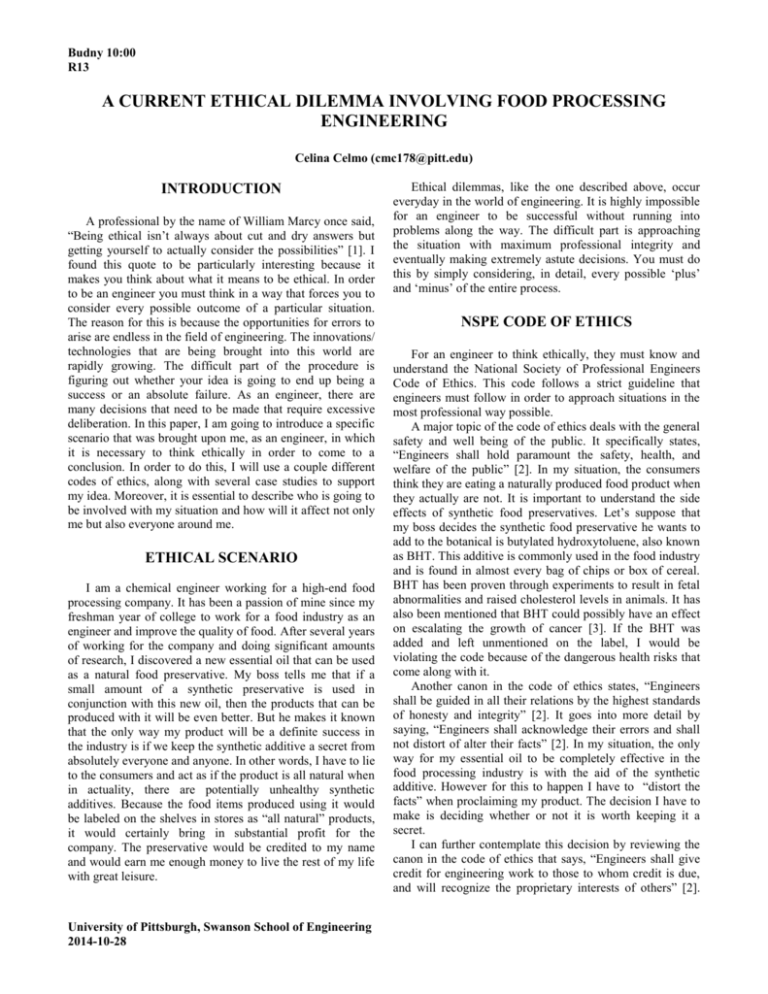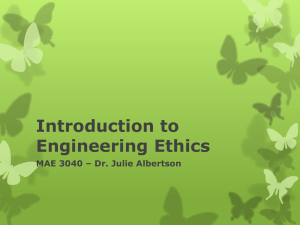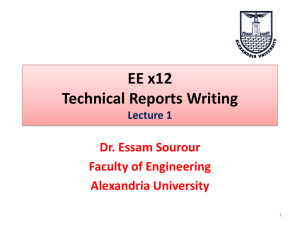A Current Ethical Dilemma Involving Food Processing Engineering
advertisement

Budny 10:00 R13 A CURRENT ETHICAL DILEMMA INVOLVING FOOD PROCESSING ENGINEERING Celina Celmo (cmc178@pitt.edu) INTRODUCTION A professional by the name of William Marcy once said, “Being ethical isn’t always about cut and dry answers but getting yourself to actually consider the possibilities” [1]. I found this quote to be particularly interesting because it makes you think about what it means to be ethical. In order to be an engineer you must think in a way that forces you to consider every possible outcome of a particular situation. The reason for this is because the opportunities for errors to arise are endless in the field of engineering. The innovations/ technologies that are being brought into this world are rapidly growing. The difficult part of the procedure is figuring out whether your idea is going to end up being a success or an absolute failure. As an engineer, there are many decisions that need to be made that require excessive deliberation. In this paper, I am going to introduce a specific scenario that was brought upon me, as an engineer, in which it is necessary to think ethically in order to come to a conclusion. In order to do this, I will use a couple different codes of ethics, along with several case studies to support my idea. Moreover, it is essential to describe who is going to be involved with my situation and how will it affect not only me but also everyone around me. ETHICAL SCENARIO I am a chemical engineer working for a high-end food processing company. It has been a passion of mine since my freshman year of college to work for a food industry as an engineer and improve the quality of food. After several years of working for the company and doing significant amounts of research, I discovered a new essential oil that can be used as a natural food preservative. My boss tells me that if a small amount of a synthetic preservative is used in conjunction with this new oil, then the products that can be produced with it will be even better. But he makes it known that the only way my product will be a definite success in the industry is if we keep the synthetic additive a secret from absolutely everyone and anyone. In other words, I have to lie to the consumers and act as if the product is all natural when in actuality, there are potentially unhealthy synthetic additives. Because the food items produced using it would be labeled on the shelves in stores as “all natural” products, it would certainly bring in substantial profit for the company. The preservative would be credited to my name and would earn me enough money to live the rest of my life with great leisure. University of Pittsburgh, Swanson School of Engineering 2014-10-28 Ethical dilemmas, like the one described above, occur everyday in the world of engineering. It is highly impossible for an engineer to be successful without running into problems along the way. The difficult part is approaching the situation with maximum professional integrity and eventually making extremely astute decisions. You must do this by simply considering, in detail, every possible ‘plus’ and ‘minus’ of the entire process. NSPE CODE OF ETHICS For an engineer to think ethically, they must know and understand the National Society of Professional Engineers Code of Ethics. This code follows a strict guideline that engineers must follow in order to approach situations in the most professional way possible. A major topic of the code of ethics deals with the general safety and well being of the public. It specifically states, “Engineers shall hold paramount the safety, health, and welfare of the public” [2]. In my situation, the consumers think they are eating a naturally produced food product when they actually are not. It is important to understand the side effects of synthetic food preservatives. Let’s suppose that my boss decides the synthetic food preservative he wants to add to the botanical is butylated hydroxytoluene, also known as BHT. This additive is commonly used in the food industry and is found in almost every bag of chips or box of cereal. BHT has been proven through experiments to result in fetal abnormalities and raised cholesterol levels in animals. It has also been mentioned that BHT could possibly have an effect on escalating the growth of cancer [3]. If the BHT was added and left unmentioned on the label, I would be violating the code because of the dangerous health risks that come along with it. Another canon in the code of ethics states, “Engineers shall be guided in all their relations by the highest standards of honesty and integrity” [2]. It goes into more detail by saying, “Engineers shall acknowledge their errors and shall not distort of alter their facts” [2]. In my situation, the only way for my essential oil to be completely effective in the food processing industry is with the aid of the synthetic additive. However for this to happen I have to “distort the facts” when proclaiming my product. The decision I have to make is deciding whether or not it is worth keeping it a secret. I can further contemplate this decision by reviewing the canon in the code of ethics that says, “Engineers shall give credit for engineering work to those to whom credit is due, and will recognize the proprietary interests of others” [2]. Celina Celmo My preservative would be credited to my name, however that brings up another question of whether or not I actually want it to be. I have to consider the possible consequences that the future has to hold. For example, there could be a time when a consumer sues a company for having products that lead to cancer or another sickness/disorder. The company could decide to examine products and find out that it was a lie from the start. If this were to happen, I would immediately lose my career. Thus far, I have discussed several different downfalls of the situation. However, it is equally as important to discuss the benefits. One of the canons that I previously mentioned states that “Engineers shall, whenever possible, name the person or persons who may be individually responsible for designs, inventions, writings, or other accomplishments” [2]. In other words, I am being credited for this invention. I already discussed how this could end horribly, but it is necessary to debate just the opposite. I have been researching the topic of food processing engineering since I graduated college. Therefore I am positive that the botanical would be a success. Botanicals work as a food preservative because they prevent the growth of microorganisms, retard oxidation of fats, and inhibit natural aging and discoloration [3]. Synthetics work the exact same way, which is why adding it would only make the resulting products that much better. Assuming that the secret stays a secret forever, I would bring in enough money to be set for the rest of my life. Essentially, this huge benefit is exactly the reason why the choice I have to make is so difficult. I have concluded that the code of ethics is extremely useful in aiding me towards my final decision. A lot of the problems that I am running into throughout the process are mentioned in the code. OTHER VALUABLE SOURCES Big decisions like this one require assistance from a wide variety of sources. Regardless of the extensiveness of the issue I am faced with, there are always two people in my life that I would automatically turn to, my father and my sister. I would consider them both to be useful sources in helping me deal with my current ethical dilemma because they both have years of experience. My sister is a graduate of the Swanson School of Engineering and currently works for a construction company as a project engineer. She has already experienced multiple ethical scenarios where she had to make a big decision. Similarly, my father has been a director of field operations for a construction company for many years and would be able to help me from a professional standpoint. After having a group discussion with the both of them, my sister’s advice was to “look at the situation in the long run perspective” [5]. This really got me thinking about my future as a chemical engineer. My dad also added, “the only way to deal with any type of problem is by investigating it step by step” [6]. In other words, you cannot make a decision instantly because it requires a lot of time and a lot of effort. I have concluded that my sister and father are great resources because they made me think more about the bigger picture, which is essentially what I am most concerned about. ETHICAL ARTICLES An article about the ethics of engineering states, “when something goes wrong in an engineering project, the responsibility falls heavily on the engineers” [7]. Engineers are constantly being pressured by the world as a whole and more specifically their managers, clients, and other professional associations amongst them. Additionally, their responsibility of handling massive projects could end horribly with just one wrong move. El- Zein expresses the responsibility of an engineer by saying; “Engineers build the modern world and improve the lives of many” [8]. Therefore, it is important to discuss who could possibly be affected by any situation. In my situation, my decision is affecting my company, other companies that would eventually invest in my innovation, and most importantly the consumers. Both articles describe a scenario that emphasizes the pressure of an engineer simply by paying closer attention to the ethics involved. CHEMICAL ENGINEERS CODE OF ETHICS The other code of ethics that must be taken into consideration by professional engineers pertains to that person’s specific field of study; mine being the Chemical Engineers Code of Ethics. In addition to the NSPE Code of Ethics, it is helpful in making my decision. I have noticed that there are a lot of similar aspects between the two codes. As a member of the American Institute of Chemical Engineers, I am required to “Issue statements or present information only in an objective and truthful manner” [4]. This follows along with the information I previously mentioned about presenting false information. Although I would be following another canon in the code by “acting as a faithful employee,” I would not be acting “faithful” to the world [4]. In my opinion, the effect my decision has on the world is more significant than anything else. CONCLUSION The food industry, specifically food processing and packing, has been a big controversy for an extensive period of time. Nowadays, increasingly more people are trying to go ‘all-natural’ because they think it is the healthiest 2 Celina Celmo alternative for them. Others however, are highly against the idea of going natural. When dealing with natural food preservation, there are going to be many dilemmas in the future that food-processing engineers are faced with. Although I only described one specific situation, I learned many useful objectives along the way. Generally speaking, dealing with an ethical dilemma is not easy because it is not something that can be answered right away. However when I was put into a situation, I broke it down into smaller parts to help make a final decision. [3] R. Bhat, A. K. Alias, G. Paliyath. (2012). Progress in Food Preservation. Oxford, UK; Ames, Iowa. (Print Book). pp. 513-522 [4] “Code of Ethics.” AlChE. American Institute of Chemical Engineers, 2014. (Website). http://www.aiche.org/about/code-ethics [5] N. Celmo. (2022, Mar. 16). Conversation. [6] J. Celmo. (2022, Feb. 26). Conversation. [7] J. M. Basart, M. Serra. (2011). “Engineering Ethics Beyond Engineers’ Ethics.” Science and Engineering Ethics. (Online article). 10.1007/s11948-011-9293-z [8] A. El-Zein. (2013). “As Engineers.” The Guardian.com. (Online article). http://www.theguardian.com/commentisfree/2013/dec/05/en gineering-moral-effects-technology-impact RECOMMENDATIONS TO ENGINEERS I think one of the most important things to understand when dealing with ethical issues is that nothing is “cut and dry,” which is exactly what I quoted in the beginning of the paper. I learned that many sources and tools must be used when approaching an ethical issue with maximum professional integrity in the field of engineering. There are different ways that professional engineers may approach a dilemma, however I would recommend some procedures over others. First, talk to the people that you would normally turn to if there were complications in your life. If you don't have a specific person in mind, venture out to an area where it is quiet and easier to think about the situation. Talking with other people will get your mind headed in the right direction. When it comes time to consider the ethics of your situation, you should immediately review the National Society of Professional Engineers Code of Ethics as well as the Code of Ethics dedicated to your specific field of study. The reason for this is because every professional engineer is required to follow these codes and violating them could result in serious consequences. Another method that I would suggest would be to look at how other people have dealt with similar scenarios. Simply by studying case studies completed by engineers of the past, you could gain a better standpoint on your topic. Lastly, I would say the most important and time consuming step would be to think about how the world around you will be affected by your decision. With the correct tools and processes that I mentioned, I believe that every professional engineer of the future should be able to make careful decisions when faced with an ethical dilemma. ADDITIONAL SOURCES W.J. Frey. (2012). “Chemical A or B?” Online Ethics Case Studies. http://www.onlineethics.org/Resources/Cases.aspx K.S. Mangan. (2006). “Sometimes Silence is Golden” Chronicle of Higher Education. http://www.webguru.neu.edu/professionalism/researchintegrity/ethics-case-studies “The Coercive Contribution Conundrum- Case 1006” University of Washington. http://www.depts.ttu.edu/murdoughcenter/products/cases.ph p ACKNOWLEDGMENTS First, I would like to thank the writing center for answering all of my questions at the beginning of the assignment. Secondly, I would like to thank Emelyn Fuhrman for doing an exceptional job explaining the assignment. Most importantly, I want to thank my writing instructor because she got my mind pointed in the right direction. This assignment was very difficult and time consuming, however it made me think even more about my future and why I want to be an engineer. REFERENCES [1] E. Butterman. (2014). “Ethics in Engineering.” ASME.org. (Online Article). https://www.asme.org/engineeringtopics/articles/engineering-ethics/ethics-in-engineering [2] “NSPE Code of Ethics For Engineers.” NESP. National Society of Professional Engineers, 2014. (Website). http://www.nspe.org/resources/ethics/code-ethics 3








